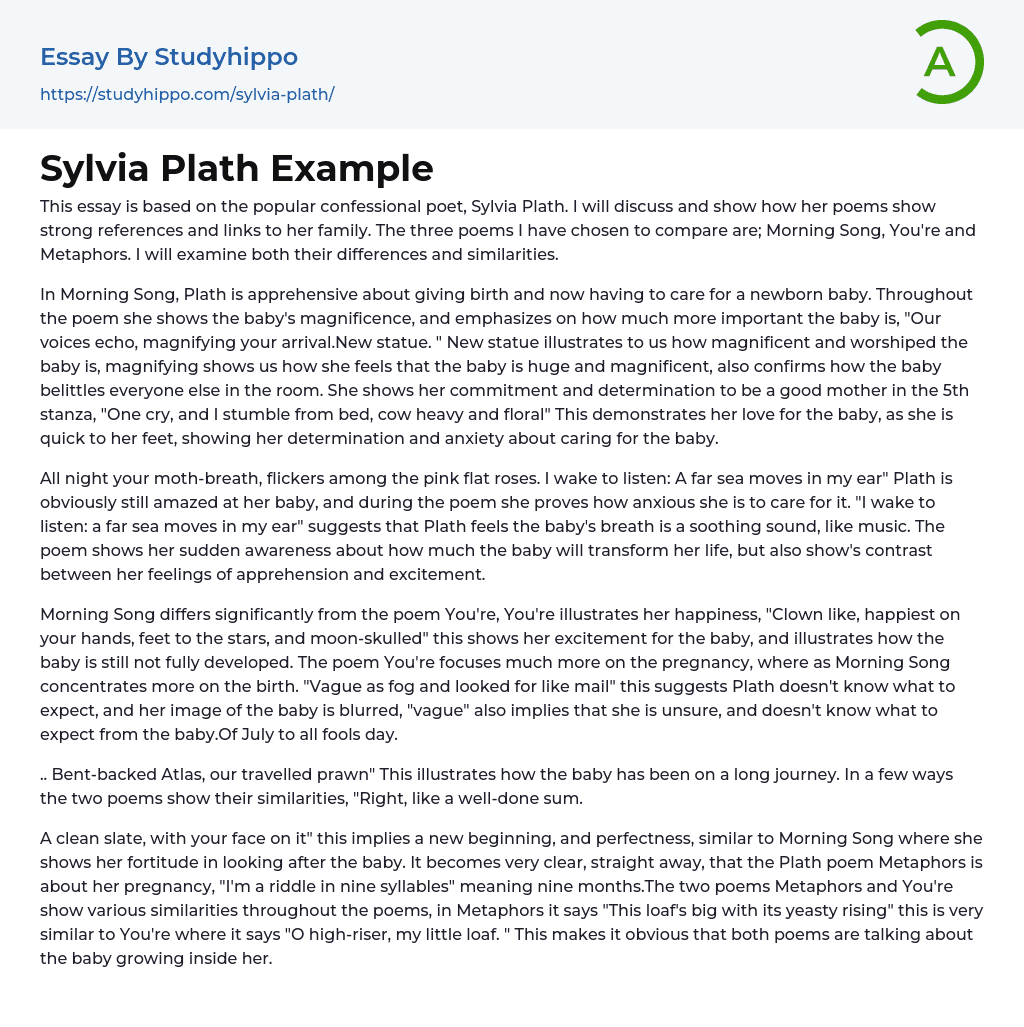In this essay, I will explore the works of Sylvia Plath, a renowned confessional poet, and demonstrate how her poems showcase notable connections and allusions to her family. I have selected three poems- "Morning Song," "You're," and "Metaphors"- which I will compare and contrast, analyzing both their resemblances and disparities.
Plath's Morning Song reveals her apprehension towards giving birth and caring for a newborn baby. Throughout the poem, she highlights the magnificence of the baby and emphasizes their importance as a "new statue" that belittles everyone else in the room. Plath also demonstrates her commitment to being a good mother in the 5th stanza when she quickly responds to the baby's cry despite feeling "cow heavy and floral." Overall, Morning Song showcases Plath's mixed emotions towards motherhood and her determination to
...care for her child.
Plath expresses her amazement at her baby through the use of poetic imagery, such as "All night your moth-breath, flickers among the pink flat roses." She conveys her caring nature for her child by stating "I wake to listen," and compares the sound of the baby's breath to that of a calming sea in her ear. The poem reflects Plath's realization of how much the baby will change her life, while also highlighting the contrast between her feelings of apprehension and excitement.
Compared to You're, Morning Song has a distinct contrast in its portrayal of emotions. The former expresses joy and elation about the newborn, describing the baby as "Clown like, happiest on your hands, feet to the stars, and moon-skulled." This shows that the baby is still in its early stage of development. On the other hand, You're focuses more on
the course of the pregnancy. In Morning Song, Plath concentrates primarily on the birth with lines like "Vague as fog and looked for like mail", which suggests her uncertainty about what to expect from her child. The word "vague" highlights her lack of clarity and anticipation towards the newborn. The poem spans from July to April fools day.
The phrase "Bent-backed Atlas, our travelled prawn" represents the baby's extended journey. Both poems share a resemblance in how they convey completeness or correctness - "Right, like a well-done sum."
The Plath poem Metaphors portrays a new beginning and perfectness, just like Morning Song where the poet shows her strength in taking care of her baby. The poem's subject matter is clearly about pregnancy as it mentions "I'm a riddle in nine syllables", referring to nine months. In both Metaphors and You're, there are similarities as they both describe the baby growing inside the poet. For instance, Metaphors says "This loaf's big with its yeasty rising" while You're says "O high-riser, my little loaf".
In the poem "Metaphors," Plath appears nervous and apprehensive about motherhood, stating "Boarded the train there's no getting off." However, in "You're," she expresses joy and enthusiasm about becoming a mother with lines like "Right, like a well-done sum. A clean slate, with your own face on." Plath employs numerous similes throughout "You're."
Her three poems; Morning Song, You're, and Metaphors, all demonstrate her emphasis on her children, while hardly ever acknowledging her spouse. This highlights her powerful protectiveness as a mother.
- American Literature essays
- Between The World and Me essays
- Book Report essays
- Book Review essays
- Book Summary essays
- Books essays
- Character essays
- Coming of Age essays
- Dante's Inferno essays
- Everyday Use essays
- Flowers for Algernon essays
- Genre essays
- Greek Mythology essays
- Incidents in The Life of a Slave Girl essays
- Letter essays
- Literary Criticism essays
- Literary devices essays
- Literature Review essays
- Metaphor essays
- Myth essays
- Play essays
- Plot essays
- Poem essays
- Poetry Analysis essays
- Protagonist essays
- Reader essays
- Reason essays
- Rhetoric essays
- Rhetorical Question essays
- Rhyme essays
- Simile essays
- Tragic Hero essays
- Translation essays
- Understanding essays
- Utopia essays
- Villain essays
- Writer essays
- Allegory essays
- Alliteration essays
- Comedy essays
- Comic book essays
- Drama essays
- Dystopia essays
- Fairy Tale essays
- Fantasy essays
- Fiction essays
- Ghost essays
- Gothic Fiction essays
- Gothic Literature essays
- Irony essays




